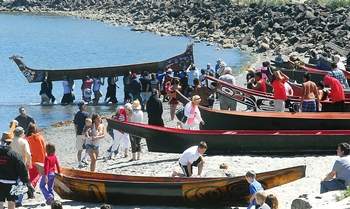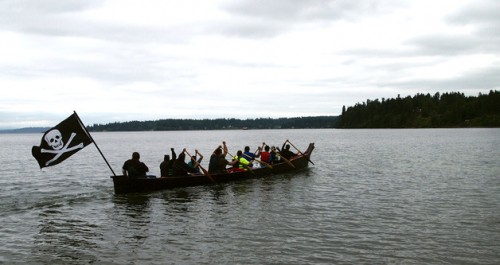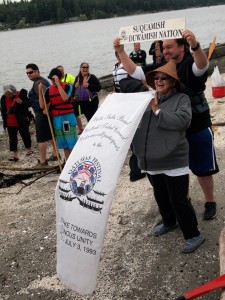By Arwyn Rice, Peninsula Daily News

PORT ANGELES — The Tribal Canoe Journeys, traditionally an annual event, is expected to take a one-year hiatus in 2015 for the first time since 1993.
“No one has stepped up to the plate to host [the Canoe Journey] in 2015,” said Frances Charles, tribal chairwoman of the Lower Elwha Klallam tribe.
The first canoe journey was the 1989 “Paddle to Seattle,” which was conceived by Quinault tribal member Emmet Oliver and Frank Brown of Bella Bella.
That led to the first Canoe Journey in 1993 in Bella Bella.
For the journeys, tribes throughout the Pacific Northwest, as well as some from Canada and Alaska, gather teams of pullers.
They leave their own shores in canoes and visit other tribal lands along the way. Before they land, they ask the host tribe or first nation for permission to come ashore.
Landings are followed by meals, storytelling and the exchange of traditional songs, dances and gifts.
The journey culminates at a different location each year in a weeklong potlatch and celebration of tribal cultures.
The journeys will resume in July 2016 for the “Paddle to Nisqually.”
Typically, a tribe will announce itself as host two to three years ahead of time, so members of the canoe families familiar with the system have known for a year that it was unlikely there would be a 2015 event, said Vickie Carroll, Canoe Journeys coordinator for the Jamestown S’Klallam tribe in Blyn.
This past July, at the 2014 Paddle to Bella Bella’s final week, it was clear there wouldn’t be one in 2015, Carroll said.
“It’s a huge, huge undertaking,” she said.
Carroll said host tribes feed and provide places for as many as 10,000 people for the final week of welcoming ceremonies, potlatches and games, which can take years for tribes to save for and plan.
“It might have to do with the cost of hosting the journey,” she said.
Most North Olympic Peninsula tribes are planning alternative cultural activities next summer.
The Lower Elwha Klallam tribe, which hosted a Canoe Journey in 2005, is planning to host a celebration of the removal of the dams on the Elwha River.
It will be a gathering similar to those of the Canoe Journeys, but for a single weekend, likely July 17-19, Charles said.
Planning for the celebration is in its early stages, and the details are still being worked out, she said.
Carroll said that when no one took up the mantle for the 2015 journey, she began working on organizing a smaller canoe trip among the Klallam sister tribes — the Lower Elwha Klallam, the Jamestown S’Klallam and the Port Gamble S’Klallam.
The trip will be organized to avoid conflicting with the Lower Elwha Klallam tribe’s Elwha River celebration, she said.
Dates for the smaller journey have not yet been established.
Many tribes organize their summer activities around the Canoe Journeys.
The Quinault Nation, located in west Jefferson and Grays Harbor counties, has hosted in the past a “warrior youth camp” that teaches traditional culture and values to young tribal members, culminating with the Canoe Journeys trip.
“I understand that our local canoe families are focusing on a canoe camping trip in the summer of 2015 with the youth, which will prepare them very well for the trip to Nisqually,” said Fawn Sharp, president of the Quinault Nation, which hosted the journey in 2013.
“While we may miss not having a Canoe Journey in 2015, the spirit of the journey is very much alive,” Sharp said.
“Setting the next one for 2016 was a wise move that will help make that event even greater.”
Sharp said the Canoe Journeys have become a touchstone gathering for the tribes of the Pacific Northwest — one of the largest traditional gatherings of indigenous people anywhere in the world.
“This outstanding cultural celebration has changed thousands of lives, infused amazing vitality into Native culture that will last generations,” Sharp said.
“It has educated hundreds of thousands of people about our customs, our legacies and our priorities in life.
“The Canoe Journeys have opened the ocean and other ancestral highways to new generations while bringing back a culture that was nearly lost,” she said.
The Quileute, who hosted a two-day celebration at LaPush in 2013 during the Journey to Quinault, will participate in the Elwha ceremony, the tribal council said.
“We recognize the importance for our neighbors to have their river flow free of obstruction so their watershed can return to a more natural state,” the council said in a written statement.
“The Elwha tribe has always been a generous host for all canoes families going through their territories, and we look forward to celebrating this historic event with them.”
The Quileute plan to travel to the potlatch in traditional canoes.
At the Makah Reservation in Neah Bay, the Makah Canoe Families are planning a cultural camp for the pullers who would have otherwise been part of the Canoe Journeys, with some activities planned for the larger Makah community, said Polly DeBari, a co-captain of the Makah Canoe Families.
The Makah hosted the Tribal Canoe Journey in 2010.
The break in Canoe Journeys is both a disappointment and a relief, DeBari said.
While those traveling do not need to plan as much as the hosts, there is a lot of organizing for the pullers, their support teams on land, their support boat and training.
“Taking on a journey for a day or a couple of days or three weeks, it’s a lot of work,” she said.



